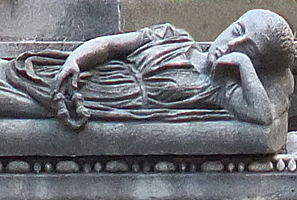
Marble sarcophagus lid, Palazzo Mattei courtyard
The young girl Erotion, dead six days before her sixth birthday, was the poet Martial’s darling home-born slave, a verna. Scholars have hypothesized her actual relationship to Martial on the basis of their reading of the three Erotion poems (Epigrammata 5.34, 5.37, 10.61), but there is no other information about her to substantiate their claims. Martial had her ashes interred in a plot he purchased and tended, probably among the tombs lining the viae outside of Rome, as Martial was there when Book 5 was published (c. 89 CE); later, when he left Rome he took care to sell the plot and the tendance of Erotion's ashes (see Epigrammata 10.61). In Epigrammata 5.34, an elegy mourning her death, Martial’s gentle verse displays his affection for her and her endearing ways. Although the child is the focus of this poem as well, we learn little more about her than how deeply Martial feels the loss of this slave child. The tone of this poem is vastly different from his earlier Erotion elegy, as its meter demonstrates immediately: Martial employs the skazon or "limping iambics", so called because the iambic trimeter verse ends abruptly with a trochee. This meter is traditionally associated with invective, but Martial uses it initially with playful effect. The poem falls into two segments, united by the theme of mourning and the recurrent use of comparison, with a transition of 4 lines (14-17) between them. The first 13 lines contain 16 comparisons in extravagant praise of Martial’s puella, not identified as Erotion until line 14. The next four lines (14-17) might well be a funerary inscription. In the last 7 lines (18-24), a kind of stand-alone epigram, Paetus claims that Martial’s loss of a slave girl is nothing in comparison to his own loss of his wife. In the last line, the poet has the final word on Paetus' ostentatious mourning. For speculations on Erotion's relationship to Martial, see articles by Bell, Jr. and Watson in the Bibliography.
Puella senibus dulcior mihi cycnis,
agno Galaesi mollior Phalantini,
concha Lucrini delicatior stagni,
cui nec lapillos praeferas Erythraeos
5 nec modo politum pecudis Indicae dentem
nivesque primas liliumque non tactum;
quae crine vicit Baetici gregis vellus,
Rhenique nodos aureamque nitelam;
fragravit ore quod rosarium Paesti,
10quod Atticarum prima mella cerarum,
quod sucinorum rapta de manu gleba;
cui conparatus indecens erat pavo,
inamabilis sciurus et frequens phoenix.
adhuc recenti tepet Erotion busto,
15quam pessimorum lex amara fatorum
sexta peregit hieme, nec tamen tota,
nostros amores gaudiumque lususque.
Et esse tristem me meus vetat Paetus,
pectusque pulsans pariter et comam vellens:
20"Deflere non te vernulae pudet mortem?
Ego coniugem" inquit "extuli et tamen vivo,
notam, superbam, nobilem, lucupletem."
Quid esse nostro fortius potest Paeto?
Ducentiens accepit, et tamen vivit!
Click on the underlined words for translation aids and commentary, which will appear in a small window. Click on the icon link![]() to the right of the text for related images and information.
to the right of the text for related images and information.